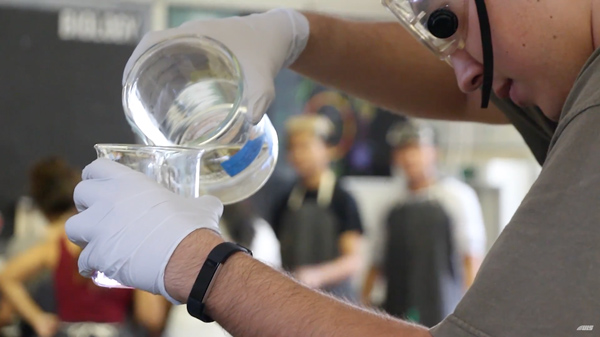ABOUT THE
SCIENCE DEPARTMENT
The University Laboratory School’s Science Department teaches disciplinary inquiry through authentic learning experiences. Teachers are facilitators of group interaction and learning. Learners construct and build on their own knowledge and understanding from their experiences working on investigations in small collaborative groups. This common knowledge is developed and clarified within the learning community.

SCIENCE COURSES
Instructor: Lindsay Gardner
Grade Level: 12
Biology is the capstone course of the science curriculum at ULS. Students integrate their knowledge of the sciences to build an understanding of life, from micro to macro, in this college-prep course. Students utilize hands-on laboratory activities, practical exams, literature reviews, and a field study to explore and enhance their exploration of biology.
Instructor: Betty Skiles
Grade Level: 11
Understanding chemistry involves the study of atoms, molecules, and how they react with each other. It also involves utilizing mathematical equations and a working knowledge of basic Algebra.
Instructor: Lindsay Gardner
Grade Level: 10
Principles in Physics and Technology is a course that focuses on topics in physics mechanics including; motion, forces, energy, work, heat and machines. Students will participate in hands on investigations to strengthen real world skills in inquiry and questioning along with problem solving to understand various measurements and quantities used in Physics.
Instructor: Jennifer Seki-Wong
Grade Level: 9
In the capstone course for the Foundational Approaches in Science Teaching (FAST) Program, students will apply their skills to laboratory and field investigations in a marine context, from physical, chemical, biological, and ecological perspectives. Topics include: earth and ocean basisn, waves and beaches, physical oceanography, chemical oceanography, transportation, remote sensing, fish, marine invertebrates, plants, and ecology.
Instructor:
Grade Level: 8
While FAST 3 incorporates several disciplinary areas of science, there is a heavy emphasis on earth and space science, biology, chemistry, and environmental science with an overall theme of “Changes Over Time”. Laboratory investigations will not be confined to the classroom, but instead will require students to make observations of the world around them.
Instructor: Jennifer Seki-Wong
Grade Level: 7
In the second year of the Foundational Approaches in Science Teaching (FAST) Program, students use the process of inquiry to explore the transfer of matter and energy through ecosystems and discover that all living organisms are part of a complex, interdependent biosphere. Topics include: light, atomic theory, matter, photosynthesis, respiration, decomposition, and global energy problems.
Instructor:
Grade Level: 6
FAST 1: The Local Environment is the introductory course for the ULS middle school science curriculum. Students are introduced to concepts in physical science and ecology as well as scientific inquiry skills and basic laboratory techniques. The course is designed to build a scientific community in which students act as scientists, collaborators, and explorers of the world around them.
